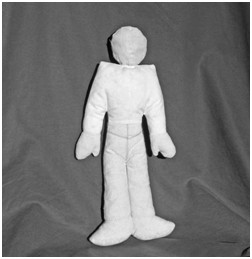Innovative doll aims at building self-esteem
Do you sometimes wish you could give your child a magic pill that would permanently build their self-esteem? While that worthy goal may be a long way off, West Windsor resident Dr. Robert Winthrop Yoskovitz believes that he may have discovered the next best thing; even though he’s the first to admit that he’s invented “nothing.”
The “nothing” that Dr. Yoskovitz is preparing to market on the Internet – and, if his product takes off, in toy stores throughout the world – is “Bupkis” (Yiddish for “nothing”), a doll that he believes will serve to help build a child’s sense of self-worth.

Awake… or asleep? Is Bupkis awake or asleep? “Who knows? Who cares?” said Bupkis’ creator, Dr. Robert Winthrop Yoskovitz. “Bupkis has no qualities whatsoever. A child is in complete control.”
According to Yoskovitz, a professor of art history and graphic design at a New Jersey college and a passionate inventor and marketer, most companies have taken exactly the wrong tack, and offer dolls that can actually diminish a child’s self-esteem.
“Doll designers have been blinded by slavish allegiance to the tenets of our consumerism-driven culture, creating emotionally complex, hyper fashionable dolls that co-opt empowerment, individuality and multiculturalism at the expense of creativity, sensitivity and attention to core principles,” he explained.
Enter Bupkis, a doll whose power to build self-esteem lies in its utter lack of features, features that Dr. Yoskovitz posits serve to project unreachable idealizations that can intimidate and threaten a child’s self-image during a most critical period in their development.
Unlike commercially popular fad dolls like the “Bratz” series, Bupkis’ strength lies in its complete nothingness. Constructed of simple, neutrally colored cloth, Dr. Yoskovitz pointed out the absence of facial characteristics, detailed clothing, or even a sexual identity. Inspired by a genre of doll used by child psychologists, Yoskovitz is branding the doll and touting its benefits to a far broader target market.

Tickle me Bupkis? Bupkis, a doll designed to build a child’s self-esteem, represents years of research and a substantial personal investment. But whether the marketplace will respond to a completely featureless doll remains an open question, according to Dr. Robert Winthrop Yoskovitz, the doll’s creator.
“The beauty of Bupkis is that it is whatever your child wants it to be,” Dr. Yoskovitz explained. “No personality, no identity. It is completely non-threatening.”
He also pointed out that painstaking quality control will ensure that every Bupkis is like every other Bupkis. “Furthermore, no Bupkis accessories will be available, so children cannot compete to out-accessorize their dolls. They must cherish their Bupkis for what it is. Or is not.”
Dr. Yoskovitz noted that his observations of his own daughter inspired him to create Bupkis. “I noticed that the first thing Polly did whenever we gave her a new doll was pull off its face, hair and clothing, and arranged it in tableaux that I’m sure were never intended by the manufacturer,” he recalled. “One day it led to a ‘Eureka!’ moment for me, and Bupkis was born.”
The irony of that moment was not lost on Dr. Yoskovitz. “The creation of Bupkis is a complete negation of the constructivist, deconstructiveist ethos,” Dr. Yoskovitz said. “Then again, it may all amount to mere birdsong; bupkis, if you will.”
Yoskovitz noted that a national advertising campaign, including an eCommerce Website to handle online sales, is slated to launch in the fall.
————
 George Point’s work has appeared in The New York Times, Princeton Packet, Kelsey Review, US 1, Hudson County Magazine, ARTimes, Gold Coast Magazine, and other local and regional publications. When he’s not concocting zany stories or playing at writing plays, he specializes in marketing and business communication. George lives and works in Lawrenceville, New Jersey.
George Point’s work has appeared in The New York Times, Princeton Packet, Kelsey Review, US 1, Hudson County Magazine, ARTimes, Gold Coast Magazine, and other local and regional publications. When he’s not concocting zany stories or playing at writing plays, he specializes in marketing and business communication. George lives and works in Lawrenceville, New Jersey.
